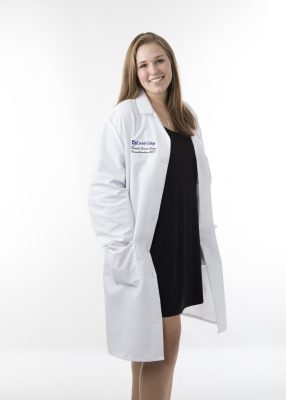Anderson thrives as researcher, traveler, leader
From Spring Grove, Illinois, to Cabo San Lucas, Mexico, Libby Anderson ’18 has traveled across North America doing what she loves—scientific research. It was in Mount Vernon, Iowa, at Cornell College, where she discovered her passion for epidemiology and the pursuit of knowledge.
“My First Year Seminar course introduced me to the career of epidemiology, but performing research with professors showed me how much I would thrive in a career that values a balance between fieldwork and laboratory research,” Anderson said. “I also know that One Course At A Time has helped me prepare for graduate school in terms of managing class work, research, and working.”
Anderson majored in biochemistry and molecular biology and noted that one of the greatest things she learned from Cornell is that asking for guidance is an important part of finding success.
“One Course has taught me how to prioritize and manage my time, as well as how to ask for help,” Anderson said. “In many of my upper-level science courses, course material could be quite confusing, so I have definitely learned that asking for help is not a sign of weakness.”

Q: What activities, clubs, organizations, or work-study positions were you involved in at Cornell and how did they add to your education and enjoyment of Cornell?
A: Here at Cornell, I have been involved in Environmental Club, Intramural sports, Tri-Beta, CASL (Cornell Alumni Student Leaders), and Residence Life as a resident assistant. My involvement in these organizations has contributed to my overall Cornell experience by not only developing my leadership skills and time management skills but also by introducing me to some incredible friends.
Q: What is your biggest academic accomplishment?
A: My biggest academic accomplishment has been working with Professor Craig Tepper. Craig is known for many things, including his classroom humor and terrifying exams, but also for his research on Symbiodinium (photosynthetic symbionts) in coral. Every year, several biology/ biochemistry and molecular biology majors want to work with Craig on his research, and I was lucky enough to work on a new project of his, investigating the presence of Symbiodinium in gastropods. No published research had ever looked at Symbiodinium in gastropods, so it was incredible to be the first to study this! Additionally, I recently found out that I was accepted into Columbia University, University of Michigan, and George Washington University for graduate school.
Q: What are your post-Cornell plans?
A: I will be attending the University of Michigan School of Public Health, where I will be pursuing my M.P.H. in Epidemiology. I hope to specialize in studying the control of infectious diseases, and more specifically, zoonotic diseases.
Q: Why did you choose Cornell?
A: I chose Cornell because of One Course At A Time, but also because I knew that my education would benefit from the small class sizes and close-knit relationships with professors. My brother graduated in 2013, and is now incredibly successful and finishing up his doctoral degree at Baylor College of Medicine. His success also showed me that Cornell would prepare me for academia after Cornell.
Q: Did you study abroad? Where/ what did you study?
A: I studied abroad Block 6of this year, for my BIO 281 course on Conservation Biology. Located in Mexico, we studied the effects of ecotourism on animal populations, behavior, and health. My class, led by Professor Tammy Mildenstein, went whale watching in Cabo San Lucas and Magdalena Bay. In Cabo San Lucas, we snorkeled with a mako shark. We also swam with sea lions and whale sharks near La Paz and Isla Espiritu Santo. These experiences were incredible, but they also shined a light upon the negative effects of human disturbance on several marine species.
Q: What would you tell a prospective student about Cornell?
A: I would tell a prospective student that if they want an education in which they aren’t just a number, a college that has professors who truly care and would go above and beyond to ensure a student’s well-being, and a college that has incredible opportunities that will prepare them for their future careers, then Cornell is the place for them. You won’t regret it.



